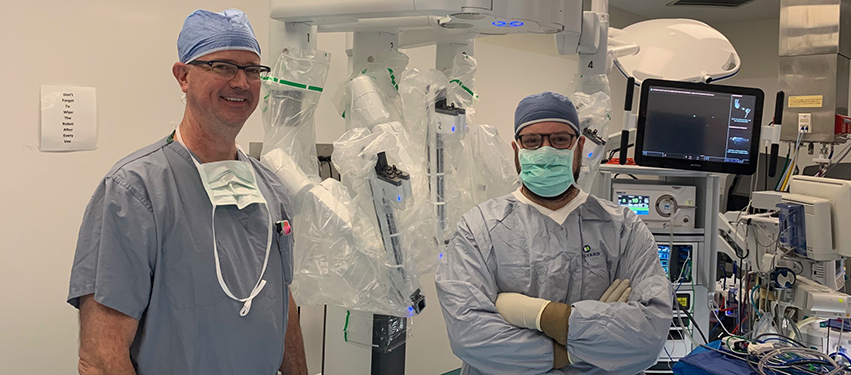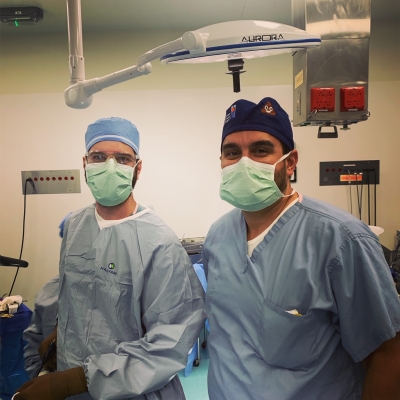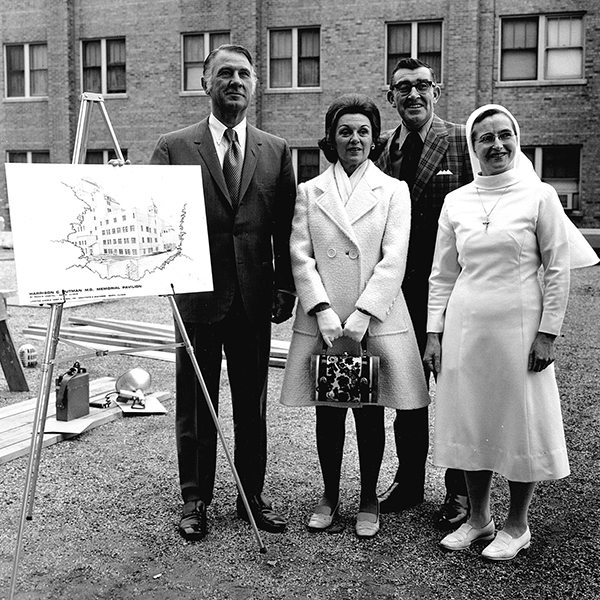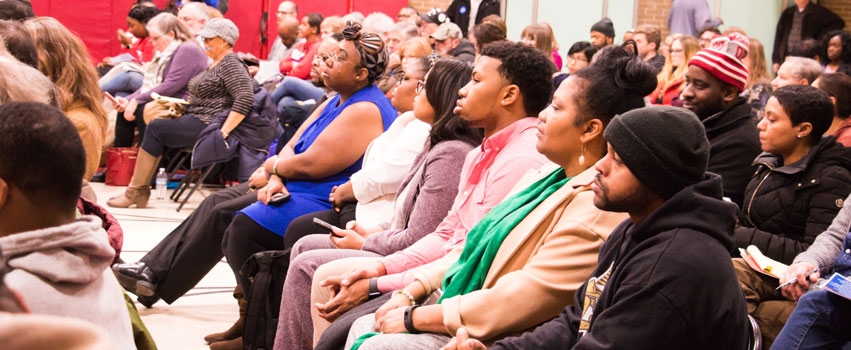Continuing a Tradition of Excellence

In 1953, a trio of surgeons joined forces and founded Peoria Surgical Group (PSG). It was a revolutionary concept at the time, as most doctors then had individual practices. But by aligning their services, Drs. Ward Eastman, Robert A. DeBord and Harrison Putman realized they could deliver better and more comprehensive care to a greater number of patients. As staunch advocates of research and education, they were also committed to training surgical residents through St. Francis Hospital (now OSF Saint Francis Medical Center)—another unprecedented move.
“When the surgical residency started taking hold… it was really a major feat to be able to attract residency trainees and board-certified surgeons in this area,” explains Dr. Thomas Rossi, PSG’s current president and CEO. “It elevated the outcomes of care, and these surgeons obviously recognized that.” More than six decades later, PSG remains on the forefront of cutting-edge medical innovations in Peoria.
Evolving Specialized Care
Over the years, PSG has expanded beyond general surgery to provide specialized services such as vascular and cardiothoracic surgeries, training and recruiting these surgeons in the 1960s and ’70s. The group was also instrumental in advancements in pediatric surgery through the 1970s and ’80s. “At the time all general surgeons were dabbling in pediatrics,” Dr. Rossi explains, “but we had the only surgeons performing surgeries that dealt with complex congenital defects in the region at OSF Saint Francis Medical Center.”
In 1987, the first board-certified pediatric surgeon joined PSG and was hired by the University of Illinois College of Medicine Peoria (UICOMP). “We were able to attract three different pediatric surgeons to… this smaller market,” he adds. “They stayed because of the volume of pediatric cases they could take from downstate.”

“PSG introduced the first formal pediatric surgery services and helped initiate a series of events that led to the establishment of Children’s Hospital of Illinois,” notes Dr. Steven Tsoraides, who joined the group in 2011. With the recruitment of pediatric surgeon Dr. Richard Pearl in 1998, PSG helped launch a series of advances that eventually led to the development of the Jump Trading Simulation & Education Center. “PSG surgeons now partner with Jump and OSF Simulation for research in virtual reality and cancer surgery,” he adds, “in addition to its National Institutes of Health-funded work through UICOMP.”
Dr. J. Stephen Marshall, chair of the UICOMP Department of Surgery, says the practice has changed dramatically over the years, in part due to demand for highly specialized services. “When I first came here in 1988, I was a general surgeon doing everything from appendectomies to hernias, gallbladder surgery, etc.,” he recalls. But over the past 30 years, the volume of information about each specialized service has increased and changed dramatically. “It’s impossible to keep up with it all,” he explains. “So now we all specialize in one area, and that’s what we focus on when we’re leading the residents.”
In 2002, PSG brought the first surgical robot to downstate Illinois, at a time when there were just 69 such platforms in the world. “There are now well over 4,000 [surgical] robots in the world,” Dr. Rossi notes. “In Peoria alone, there are five.” Robotic surgeries are non-invasive procedures in which the surgeon directs the instruments remotely, allowing them to see more accurately inside the patient. “The robot allows the surgeon more dexterity to do detailed work, which has better outcomes for patients because you don’t have an open incision,” he adds. Today, PSG surgeons perform 50 to 70 robotic surgeries each month.
Over the past decade, PSG also began concentrating on cancer care and will continue to push forward on that vision. “We’re recruiting some of the best and brightest in cancer surgery,” Dr. Rossi declares.

Passion For Education
When UICOMP first opened its doors in 1972, the doctors at PSG were instrumental in starting the surgery residency program. Today, all PSG doctors are faculty members of the university—and many say that teaching is one of the best parts of their job.
“I developed a passion for education from my PSG mentors who helped train me,” Dr. Tsoraides says. “They taught me the value of paying forward the profession and a commitment to progress and excellence.” In fact, PSG’s relationship with the Department of Surgery at UICOMP was the primary reason he returned to Peoria after his training was complete. “The opportunity to push for excellence every day as an educator is what sets PSG apart and excites me about our future.”
Similarly, when he joined PSG in 1996, Dr. Rossi says that teaching and research is what really attracted him. “I had a private practice… and I was excited about new advances in treatments, but I didn’t have anybody to share my enthusiasm,” he recalls. “It was a perfect match for me to come in and train residents—and that’s why I’m still practicing. I’d be retired by now if it wasn’t for that. I still get excited about going to conferences and working with residents.”
Dr. Marshall agrees, adding that they are building on what the founders started. “Teaching is a specialty in itself; it’s what sets us apart,” he says. “The fact that I’m a teacher has kept me much more current than if I were in private practice, because I can’t allow my students to get ahead of me. They prompt me to stay current. You can’t be complacent in medical care, as things are changing all the time.”
Expansion & Recruiting
While recruiting and retaining talent can be challenging, Greater Peoria’s world-class facilities and top-notch quality of care make it less burdensome. “Peoria can be a hard sell because it’s not Chicago, but once the residents realize what is here, they are very happy. They find out that it’s kind of a hidden gem,” Dr. Marshall explains. “When I came to Peoria, I was impressed by… the sophistication of the medical community. With very few exceptions, we offer the same level of care as any institution in Chicago or St. Louis.”
In addition, PSG’s service territory encompasses far more than just the Tri-County area. “The majority of our business is from south of the I-80 corridor, including Iowa and Indiana, all the way down to Champaign and Springfield,” Dr. Rossi explains. “The whole downstate catchment area of our patient population that come from referrals is probably close to 1.2 million people from 27 different hospitals. Patients are referred to us because we are known as the experts. We are university surgeons with the best outcomes and the best capability of doing tertiary care.”
And PSG is well-positioned to continue its success into the future. The group has grown to 18 surgeons and will likely take on more in the next year, all while maintaining the original tenets of its founders. “Our vision has always been to stay ahead of the curve and get good outcomes for our patients,” Dr. Rossi explains. “There have been attempts to copy what [PSG] has done over the past 66 years, but it’s very hard to match the expertise and quality that we brought to the community—with the ability to train residents and students—and advance not just standard care surgery, but now the cutting edge of cancer care.”
“When you look at the spectrum of care available in this area, PSG has been driving that growth since the 1950s,” Dr. Tsoraides adds. “It’s hard to imagine progress in Peoria’s medical community without PSG.” PM
For more information, visit peoriasurgical.com.
